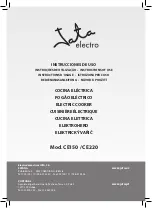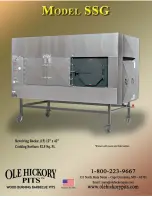
23
Instructions for the user
9.5
Cleaning the oven
For the best oven upkeep, clean it regularly after having allowed it to cool. Take out all removable parts.
• Clean the oven racks with hot water and non-abrasive
detergent. Rinse and dry.
• For easier cleaning, the door can be removed (see
“10.3 Removing the door”).
The oven should be operated at the maximum heat setting for 15/20 minutes after use of specific
products, to burn off the residues left inside the oven.
When the operation is complete, damp parts should be dried thoroughly.
9.5.1 Removing guide frames
Removing the guide frames and the self-cleaning panels
enables the sides to be cleaned more easily. This operation
should be carried out each time the automatic cleaning
cycle is used (on some models only).
To remove the guide frames:
1 Pull the frame towards the inside of the oven to unhook
it from its housing A, then slide it out of the seats at the
back B.
2 When cleaning is complete, repeat the above
procedures to put the guide frames back in.
9.5.2 Cleaning the door glazing
The glass in the door should always be kept thoroughly clean. Use absorbent kitchen roll; remove
stubborn dirt with a damp sponge and an ordinary detergent.
Do not use abrasive or corrosive detergents to clean the oven's door glass panels (e.g. powder products,
spot-removers and wire sponges). Do not use rough or abrasive materials or sharp metal scrapers to
clean the oven's glass doors since they may scratch the surface.
9.5.3 Cleaning the door seal
To keep the seal clean, use a non-abrasive sponge and lukewarm water. The seal should be soft and
flexible (with the exception of pyrolitic models).
In pyrolitic models, the seal may flatten over time and lose its original shape. To restore it, pinch the seal
all the way along. This also helps remove any dirt on the seal.












































